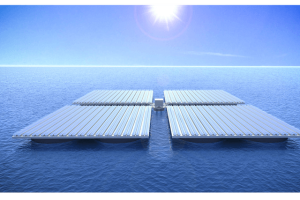Source: digitaltrends.com
Published: April 28, 2016

Offshore wind farms are growing in popularity as energy providers look for different ways of harvesting power from the sun without using valuable land resources. One unique idea being developed by engineers at Vienna University of Technology (TU Wien) is a floating platform called a Heliofloat that would function as a sea-based solar power station.
As detailed by the Vienna engineers, the Heliofloat is an open-bottom, flexible float as large as a football field and covered from edge to edge with solar panels. Heliofloats can operate as standalone platforms for smaller operations with moderate energy requirements. Multiple heliofloats also can be connected together, forming a floating solar-harvesting power grid.
Each 100-meter heliofloat is designed to stay upright even in the worst weather. Like most platforms, the Heliofloat is constructed using barrels to provide flotation, but it differs in one major way — each Heliofloat barrel is made from a soft flexible material that is open to the sea.
This open-bottom, flexible material traps air at the top of each barrel, operating much like a ballast tank at the bottom of a sub. This system creates an air pocket that acts like a shock absorber in rough weather. The soft sides of the barrel also flex when hit by waves, allowing the system to remain stable in high seas.
Not only is the heliofloat stable, its open-bottom design makes the structure lightweight and affordable to build. A similar sized, closed-bottom platform made of rigid air-filled barrels would sway and break under the pressure of massive waves. And to withstand rough water, the closed bottom structure would need to be so large that it would become impractical to build and use at sea.
Researchers found the Heliofloat technology to be so promising that they created a spinoff company to develop the platform idea for a range of industries. “Heliofloat platforms offer new possibilities for desalination plants and biomass extraction processes for salt water,” said Dr Roland Eisl, a Vienna University of Technology graduate and director of Heliofloat GmbH.
